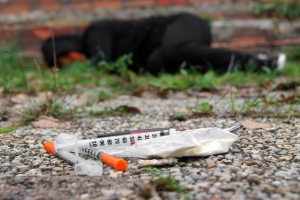Should President Trump authorize additional federal funding to address the heroin and opioid addiction crisis?

Last week, President Donald Trump declared the nation's heroin and opioid addiction crisis a public health emergency - a designation that allows the federal government to redirect resources in various ways and to expand access to medical services in rural areas.
But critics say the health emergency declaration does not go far enough because it does not bring new funding into the fight against a crisis that kills up to 100 people a day nationwide.
Addiction taking lives in NH
New Hampshire ranks No. 2 in the nation, behind West Virginia, for the number of opioid-related deaths relative to its population. It ranks No. 1, however, for fentanyl-related deaths per capita. Thus far this year, about 230 people have died as a result of drug overdoses tied to opioid, particularly fentanyl. There were 485 confirmed drug deaths in 2016, 439 in 2015, and 326 in 2014, according to data from the state medical examiner’s office.
National emergency means more federal funding
Declaration of a national emergency - not just a "public health emergency" - would have created a more robust federal response to the problem, by making resources and funding available to the worst-stricken areas of the country for both law enforcement and addiction treatment and recovery.
NH officials urge stronger executive action
U.S. Sen. Jeanne Shaheen, D-NH, attended the declaration ceremony at the White House and said the announcement was “a positive step” but that she is waiting on Trump “for meaningful follow through” on promises he made on the campaign trail, specifically to the Granite State, about a comprehensive plan and funding to help states fight the epidemic.
U.S. Rep. Ann McLane Kuster, D-1st Congressional District, said the declaration is “a welcome step” but more is needed from the administration. “The Administration should commit to working with Congress to appropriate funding so that we can get the resources necessary to those on the frontlines of this epidemic,” said Kuster, who co-chairs the Congressional Bipartisan Heroin Task Force.
National emergency declaration not the answer
Gov. Christopher Sununu said the burden of more funding does not fall on the president but on Congress. “He doesn’t have a checkbook in his back pocket,” said Sununu. “The last time I checked, Congress has to step up and provide appropriations to get this thing moving forward. They made a small step with the Cures Act, but frankly we didn’t get nearly as much money as we should have out of that.”
Others expressed concern that declaring opioid addiction a national emergency would obligate the federal government to write a 'blank check' to provide funds for a problem that is notoriously hard--and costly--to address, creating an undue burden on taxpayers.
Should the president have done more to get emergency funding to fight the opioid crisis, or is that the job of Congress? Let us know your thoughts.











Comments
Login or register to post comments